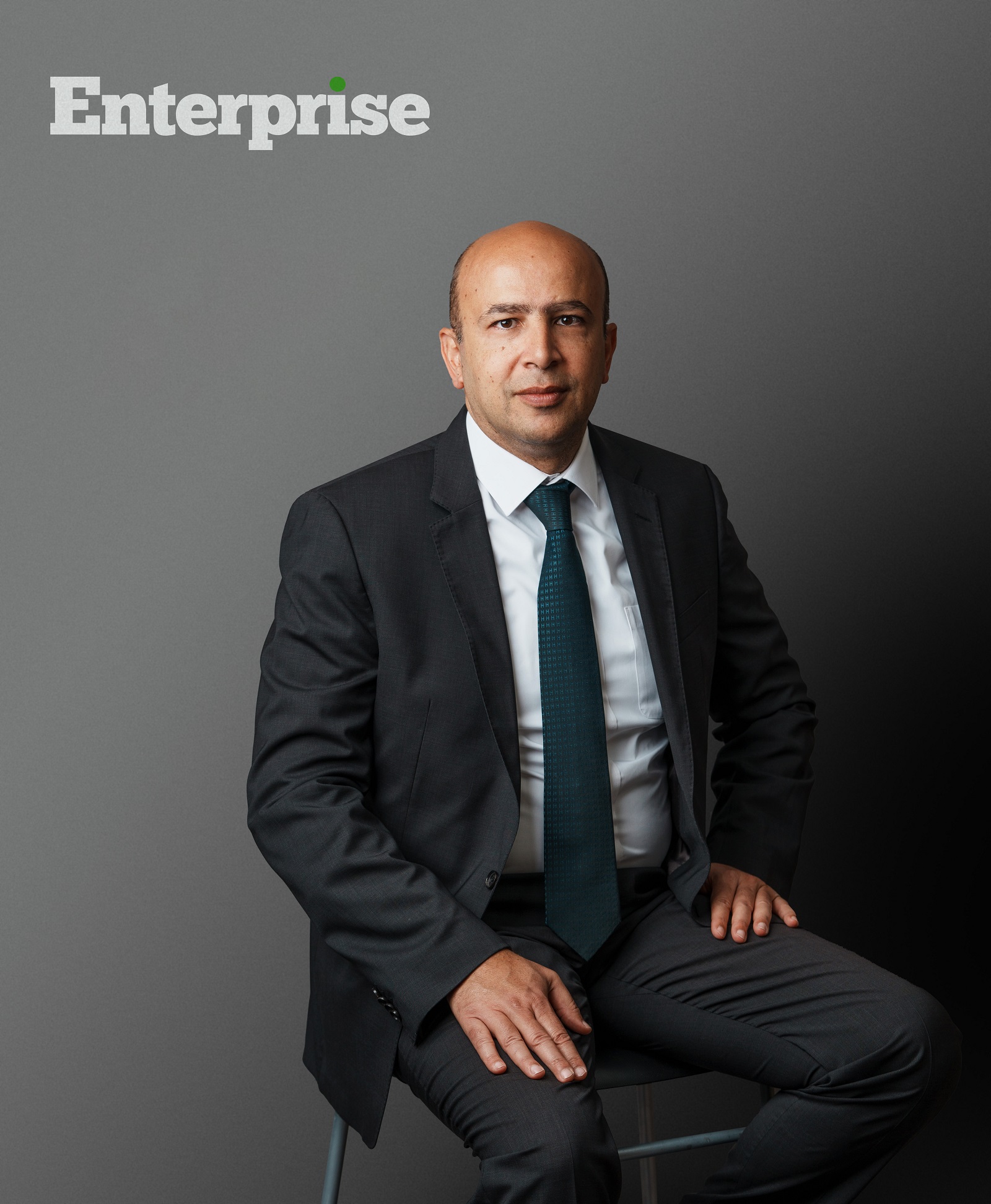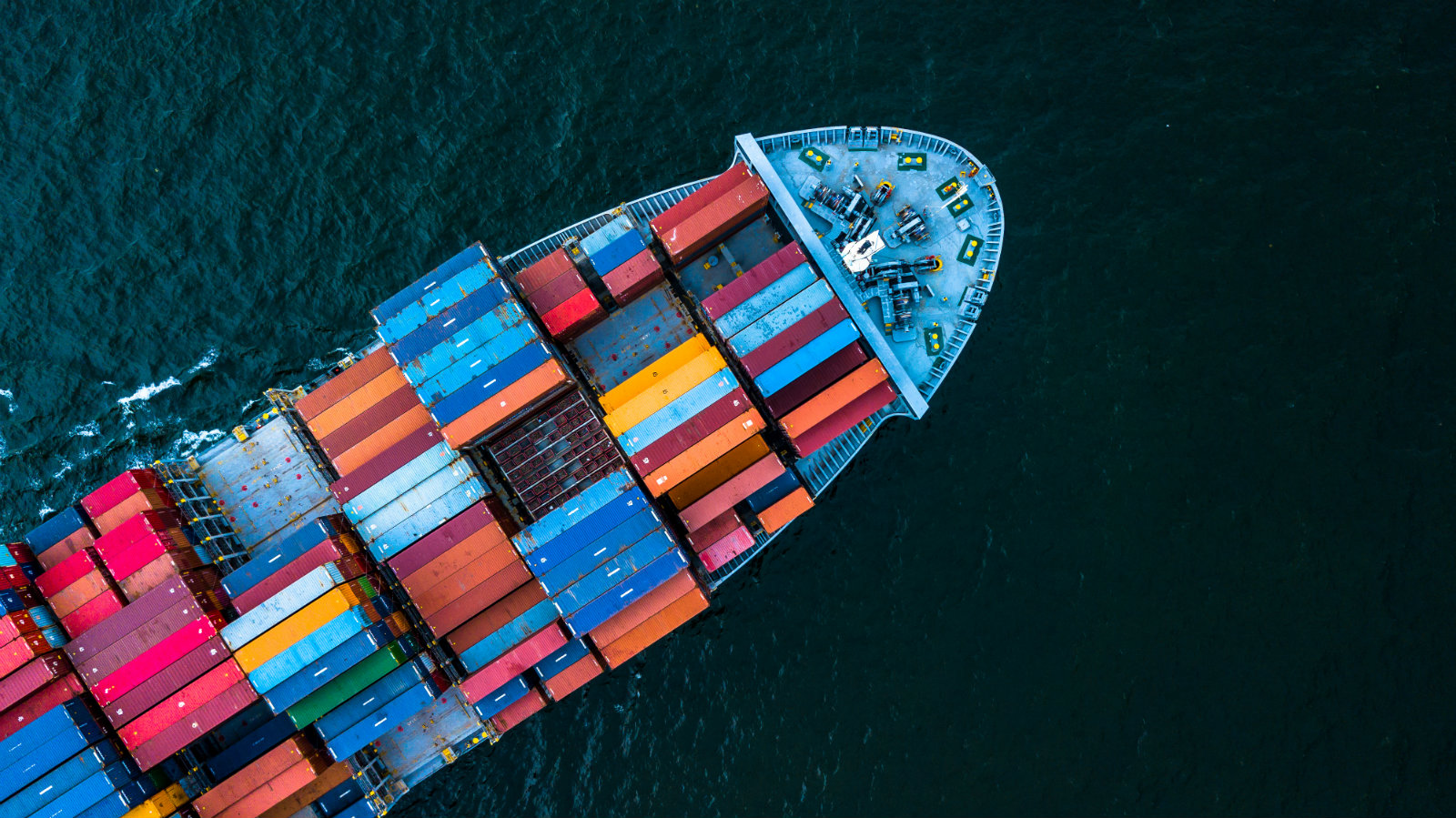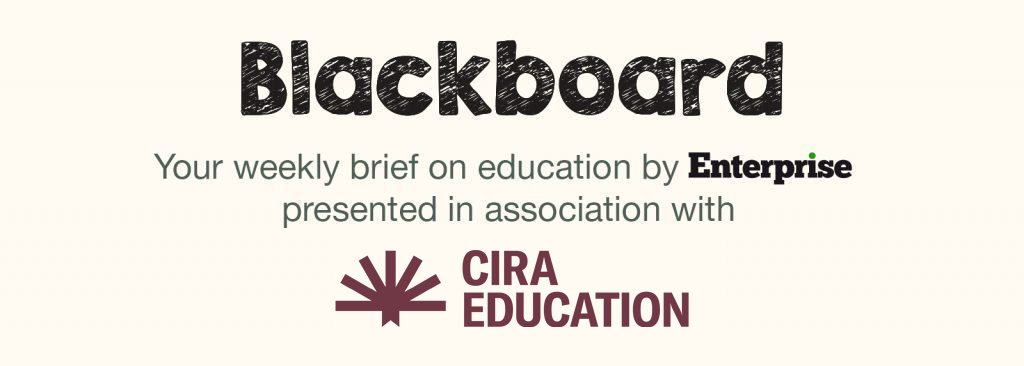- The gov’t is escalating its efforts to hold down food price inflation. (Commodities)
- Gold exporters face new curbs as central bank moves on USD black market. (What We’re Tracking Today)
- Exporting should focus on services, not just goods, says PwC’s Maged Ezzeldeen. (CEO Poll)
- EBRD lends USD 40 mn to Angel Yeast to up local production. (Development Finance)
- House passes amendment giving foreign tax authorities access to expats’ financial info. (Legislation Watch)
- Expect central banks to stay hawkish deep into 2023 amid stubborn inflation. (Planet Finance)
- The vital role of voluntary carbon markets. (A Message From HSBC)
- Messi settles the GOAT debate as Argentina win the World Cup for the first time in 36 years. (What We’re Tracking Today)
- Education in 2022: Putting covid-19 in the rearview mirror but facing a completely different set of challenges. (Blackboard)

Monday, 19 December 2022
AM — Messi leads Argentina to World Cup glory, finally ending the GOAT debate
TL;DR
WHAT WE’RE TRACKING TODAY

There’s only one place to start this morning, folks: Last night’s World Cup final was one of the most entertaining we’ve ever seen. Six goals, multiple twists and reversals of fortunes, and a dramatic penalty shoot-out to decide the winner. The pre-game Messi v Mbappe build-up truly lived up to the hype, with the French star becoming only the second person in history to complete a World Cup hattrick and Messi getting two.
It’s Argentina who walked away with the trophy, winning the World Cup for the first since Maradona led the team to victory in 1986, and, poignantly, at the first tournament since his death in 2020.
Messi finally put to bed the age-old ‘Messi v Ronaldo’ debate, leading his team to victory at what will be his final World Cup and getting his hands on the only trophy to have eluded his Portuguese rival.
AND- Hats off to Qatar for staging what was a memorable tournament that was packed with drama, upsets and, of course, great goals.
WHAT’S HAPPENING TODAY-
Gold exporters face new curbs as central bank moves on USD black market: Gold exporters will need to receive payment into a bank account within 10 days of making a sale or face being blacklisted by the banking sector under new rules (pdf) announced by the central bank yesterday designed to crack down on the parallel currency market.
The EGP/USD rate in the parallel market has weakened in recent days, following moves in the derivatives market that had the EGP falling to 30/USD in the next 12 months. The news that the IMF had approved our USD 3 bn loan program on Friday has helped to reverse some of this trend, with the rate strengthening from 36 to 32 yesterday.
Why gold exporters? Gold exporters often receive payments in USD outside the banking system, which makes it easier for them to trade hard currency on the black market, former deputy head of Blom Bank Egypt Tarek Metwally told Kelma Akhira last night (watch, runtime: 7:18). Prior to this rule gold exporters could sometimes wait up to six months before collecting payment and could rely on non-banking financial services to receive FX, he said.
Local gold prices have soared this year on the back of the falling value of the EGP. Twenty-one carat gold hit an unprecedented EGP 1.8k earlier this month but had fallen back to EGP 1.2k as of yesterday,
Tax Authority launches pilot for unified digital wage + income tax platform: The Egyptian Tax Authority has rolled out its digital wage and income tax platform for some taxpayers in a pilot phase this week, it said in a statement yesterday. The platform, which is set to launch in January, will allow companies to accurately calculate workers’ income tax and ins. payments and file their taxes via an online payroll system. The scheme joins the unified digital tax system and e-invoicing initiatives as part of government moves to digitize tax collection.
On the House agenda today: MPs will vote on amendments to the Suez Canal Authority law that would establish a EGP 10 bn investment fund and Supply Minister Ali El Moselhy will brief the House economic affairs, budget and defense committees on the ministry’s short-term plans for ensuring the availability of basic commodities and controlling food prices.
THIS WEEK-
It’s the Central Bank of Egypt’s final policy meeting of the year on Thursday, and analysts we surveyed last week expect policymakers to close out 2022 with another king-size 200-bps rate hike to support the currency and tackle rising inflation. Seven of the nine analysts and economists are forecasting the central bank to raise rates, five of which see a 200-bps hike. This would take the policy rate to 15.25%, its highest level since early 2019.
EGX-listed Pachin will brief shareholders on acquisition offers it has received in its ordinary general assembly on Tuesday, 20 December. Dubai-based National Paints Holdings has offered to purchase 100% of the company for EGP 29 per share, valuing it almost EGP 700 mn and far outbidding earlier offers from Universal Building Materials and Chemicals (Sipes) and Saybad Industrial Investment that have since been withdrawn.
THE BIG STORIES ABROAD-
Elon Musk has given Twitter users the opportunity to fire him as CEO of the company in a poll on the social media site. “Should I step down as head of Twitter? I will abide by the results of this poll,” the under-fire tech bn’aire wrote in a post last night. The Tesla / SpaceX / Twitter CEO has come under non-stop criticism following his takeover of the social media site, from firing half of its staff, restoring banned accounts and most recently deactivating the accounts of critical journalists.
The live results just before dispatch this morning: With more than 8 mn votes cast, 57% of users had voted ‘yes’ with eight hours remaining.
Is SBF ready to face the music? Former FTX CEO Sam Bankman-Fried is expected to agree to be extradited to the US in front of a Bahamas court today, reversing an earlier decision to contest extradition. Bankman-Fried faces multiple charges following the collapse of the crypto exchange and its associated hedge fund Alameda last month, in what prosecutors have described as one of the “biggest financial frauds in American history.” It’s likely prosecutors will argue to deny Bankman-Fried bail on his arrival in the US on grounds that he is a flight risk, given the bns of USD of lost money in the case. The story is getting coverage in Reuters, the New York Times, and Bloomberg, among other outlets.
The land-for-FX scheme looks to be gaining steam: “Many Arab and foreign investors” have submitted direct requests to the New Urban Communities Authority (NUCA) to buy state-owned land plots in USDs, Walid Abbas, assistant housing minister and supervisor of planning and projects at NUCA, told CNBC Arabia. NUCA is accepting foreigners’ direct USD bids for land outside of its usual lengthy auction system, Abbas said. Investors will be handed their plots within a month of paying a 5% USD deposit to NUCA, with the remainder to be paid in USD installments transferred from abroad.
BACKGROUND- The cabinet earlier this month agreed to sell land in Sadat City to an unnamed Gulf investor to set up a housing project, setting a precedent to approve similar cases where foreign investors agree to pay for land in FX. The move is part of a series of government measures designed to attract inflows amid a squeeze on hard currency in the country — including the expat car import scheme and tax breaks for industrial investors who use FX to fund their projects.
|
ICYMI-
Missed this week’s Inside Industry? In our weekly vertical exploring all things industry and manufacturing, we looked at the ups and downs of Egypt’s industrial sector in 2022, including a push for import substitution and localization.

*** It’s Blackboard day: We have our weekly look at the business of education in Egypt, from pre-K through the highest reaches of higher ed.
In today’s issue: With rising inflation and two EGP devaluations throughout the calendar year, coupled with several sector-wide shakeups and policy shifts, the education sector’s first academic year without covid lockdowns was not exactly uneventful. We recap some of the big trends and developments in the sector this year.
Somabay brings out the best in majestic natural elements where raw beauty and endless activities reign supreme. Immerse yourself into a picturesque getaway all year long. This is simply Somabay. For more information, call 16390 or visit www.somabay.com.
COMMODITIES
A new task force will suggest fair prices for up to 15 strategic commodities

The Supply Ministry has set up a committee to determine the “fair price” of a number of foods classed as strategic commodities amid soaring inflation. Representatives from the Consumer Protection Agency, the Federation of Egyptian Industries, and the Federation of Egyptian Chambers of Commerce will decide prices for between 10 and 15 foods in a bid to clamp down on price gouging, the ministry said in a statement yesterday.
These aren’t price controls: It will not be compulsory for retailers to adhere to the committee’s fair price list — except in the case of rice, the statement read. The fair prices will factor in the cost of production and inputs, Supply Minister Ali El Moselhy said.
Most of the key foods are on the list: The state is still working on the list of goods which fall under the strategic goods umbrella but so far it includes sugar, rice, oils, pasta, ghee, flour, vegetables, fruits, meat, poultry and fish, Abdel Moneim Khalil, head of internal trade at the Supply Ministry, told Al Mal.
Annual urban inflation accelerated to a five-year high in November, with food and beverage costs — the biggest single component of the basket of goods and services used to measure inflation — rising nearly 30% y-o-y. November’s data is the first month that reflects the impact of the central bank’s decision to devalue the EGP at the end of October, which has seen it lose c.25% of its value against the greenback.
The Supply Ministry has been battling food inflation this year: The cabinet last week extended until at least mid-March a cap on the price of rice, which was added to the list of strategic commodities last month in a bid to clamp down on hoarding. Partial caps on the price of unsubsidized bread have also been in place at times this fall, while the Supply Ministry has recently floated the idea of putting controls on sugar prices.
Retailers have until the end of the month to start labeling their products: El Moselhy gave retailers two weeks starting yesterday, 18 December, to ensure prices are displayed clearly on all of their products, in keeping with new rules introduced last week to tamp down on food price inflation. Local authorities will be conducting checks to raise awareness of the new rules and ensure retailers are displaying the prices of their goods correctly, El Moselhy said. Once the two-week grace period expires, authorities will take legal action against retailers who fail to comply.
The tone is nothing but serious: Anyone who doesn’t comply with pricing rules is at risk of having their shops shut down and their stock confiscated and sold to citizens, Prime Minister Moustafa Madbouly warned last week.
The story received attention internationally: Reuters.
BARLEY RICE IS OFF THE HOOK-
The Supply Ministry is no longer interested in barley rice and is now only after hoarders of white rice, according to a statement cited by Al Borsa. The ministry has recently cracked down on rice producers, sellers and distributors, giving them until Sunday to notify authorities of how much rice they’ve stockpiled and where they’re keeping it,
REMEMBER- Rice has been designated as a “strategic commodity” for at least three months under efforts to deter traders who try to exploit the shortage of commodities.
STEEL PRICES JUMP AGAIN-
Ezz Steel and Egyptian Steel Group each raised their prices by EGP 2k per ton as of this week, according to Al Mal. Ezz Steel will now sell at EGP 23.5k per ton, while Egyptian Steel raised its price to EGP 23.4k per ton. This is the third price hike in December alone
ICYMI- Steel companies have been raising prices this year — with three hikes coming in December alone — due to rising input prices caused by the depreciation of the EGP. The price hikes have squeezed margins for contractors and real estate developers.
DEVELOPMENT FINANCE
EBRD lends USD 40 mn to Angel Yeast to up local production

The European Bank for Reconstruction and Development (EBRD) is lending USD 40 mn to the Egyptian branch of China-based yeast maker Angel Yeast. The loan will help the Shanghai-listed conglomerate to up local production of yeast products for export, helping Egypt “attract much-needed foreign direct investment (FDI) to the agribusiness sector,” the multilateral lender said in a statement.
How the funding will be used: The money will help Angel Yeast Egypt build a new storage facility and incorporate more raw materials from local private-sector suppliers, the EBRD said. The partnership will also see the company process some 81k tons of waste sugar beet and cane molasses to turn them into yeast products and organic fertilizers. The EBRD loan will also go towards improving quality and operating standards, and hiring and training recent graduates in Beni Suef.
Background: The EBRD loaned Angel Yeast Egypt USD 52 mn in 2018 to build its Beni Suef yeast extract factory, which came online the following year. Angel Yeast Egypt is fully owned by its parent company, which is the world’s third-largest producer of dry yeast and second-largest producer of yeast extract, according to the EBRD.
ELSEWEDY OKAYS AFREXIMBANK LOAN- Elsewedy Electric’s board has approved taking out a USD 200 mn revolving loan from Afreximbank, it said in an EGX disclosure (pdf). The company didn’t elaborate on how the loan will be used.
CEO POLL
Exporting should focus on services, not just goods, says PwC’s Maged Ezzeldeen

We recently had breakfast with 20 top CEOs to talk about why exports and FDI are key to our economy going forward. After reading our five-step recipe for turning Egypt into a global export hub and FDI magnet, every participating CEO has agreed to answer two questions on the record.
We’ve already heard from: GSK’s Mohamed El Dababy | McKinsey’s Jalil Bensouda | Somabay’s Ibrahim El Missiri | ALC Alieldean Weshahi & Partners’ Bahaa Alieldean | HSBC Egypt’s Todd Wilcox | Actis’ Sherif El Kholy | Amazon’s Omar El Sahy | BII’s Sherine Shohdy | Mansour Automotive’s Ankush Arora | Apex’s Tom Maher | Travco’s Moataz Sedky | IACC’s Nada El Ahwal.
Speaking to us today: Maged Ezzeldeen (LinkedIn) is Egypt senior partner and deals leader at PwC Middle East. PwC is one of the largest international professional network services and is among the Big Four accounting firms. Maged has been with the firm for almost 30 years and is currently a board member of the British Egyptian Business Association, Egyptian Private Equity Association, Entrepreneurs’ Organization, and Malikah.
ENTERPRISE- Which industry would you put on a focused short list — and why?
MAGED EZZELDEEN- I would start with our outsourcing industry. Egypt is aiming to increase its exports to reach USD 100 bn, but we always seem to think of goods, rather than services, when addressing exports. But whether it be goods or services that we are
exporting, in my humble opinion, we are more competitive with India than we are with China
in the offshoring of services. The export subsidy program currently only applies to exported goods, but I think there’s a good chance to extend the program to include services as well.
If we focus on offshoring, we could open up lots of areas that support the idea of “exporting services,” through three main categories. The first is business process outsourcing, which is a practice in which an organization contracts with an external service provider to perform an essential business function or task. The second is managed service, like IT, human resources, or finance, so a company can outsource day-to-day management responsibilities and functions to cut expenses and streamline operations. Then there’s high-tech outsourcing, which is the use of external service providers to effectively deliver IT-enabled business processes and infrastructure solutions for business outcomes.
Egypt is primed to expand its offshoring because it has a lot of competitive advantages: We have a large talent pool in the skilled workforce, which is one of the cornerstones of Egypt’s very unique position among global outsourcing destinations. Within this talent pool, we also have attractive language skills. In addition to having Arabic as our official language, English and French are widely spoken and we have a significant number of German speakers thanks to the variety of our schooling systems. Then there’s the proximity to key markets thanks to Egypt’s strategic location at the crossroads of Europe, Africa, and Asia. Egypt is cost competitive when we look at operating costs per full-time equivalent (FTE), which can save as much as 30% of costs when compared to other outsourcing destinations like Poland, Ukraine, Bulgaria, or Romania. And we can’t forget that there’s major government backing, whether it comes to investments in high-quality digital infrastructure or providing financial incentives to outsourcing players.
E- Why are exports and FDI the way forward?
ME- We’ve experienced major currency devaluations more or less every century, and we’ve seen three in the past six years alone. I’m not an economist, but if any country consumes more than it produces and imports more than it exports, it will inevitably face an FX shortage and deplete its reserves.
Everybody knows Egypt’s main FX sources: The tourism sector, remittances, Suez Canal revenues, FDI and hot money, and exports. The first three sources there are beyond government’s control — there are events like the pandemic that can significantly impact the tourism industry, and Suez Canal revenues are directly linked to international trade levels. Similarly, given that around 65% of remittances are from Egyptian expats in the Gulf, we’re at the mercy of shifting trends in these countries, such as nationalization which can reduce remittances.
By contrast, increasing FDI and exports are two things that we can control. Considering the economic challenges Egypt is currently facing, focusing on import substitution and increasing our exports might help decrease the pressure on the EGP. Attracting FDI is central to Egypt’s development strategy; it has multiple benefits like creating new jobs and reducing poverty. That will, in turn, feed into the government’s steps to curb inflation, increase local production and exports, reduce reliance on imports, and shore up FX reserves.
To increase FDI, Egypt must improve its business climate by eliminating uncertainty and making regulatory and legislative stability by the order of the day. Investors need to be able to estimate tax exposure with reasonable certainty, and the government must work on rapid dispute resolution and stop crowding out the private sector.
The expansion of golden licenses for industry is a very encouraging step. So is the drafting of the state ownership policy document to ensure level playing field for all businesses, improving the infrastructure, and availing energy to the industrial sector and industrial land allocations to fight corruption.
A MESSAGE FROM HSBC
The vital role of voluntary carbon markets

With 2030 not that far away, if nations and companies are to accelerate towards their net zero targets, voluntary carbon markets have an essential part to play.
The transition to reach 45% carbon reductions by 2030 and net zero by 2050 needs to accelerate. The voluntary carbon market, when used by companies to complement — not substitute — the decarbonization of their own operations as they transition to net zero, is one tool that could accelerate action to tackle climate change.
Helping companies to decarbonise must therefore remain paramount, including across their entire value chain.
Many solutions to reduce these emissions, such as renewable energy, electric vehicles, efficient home insulation, low emissions lighting and ground or air source heat pumps, are now moving into the mainstream, and must be financed at scale.
Alongside this, momentum has been increasing in the voluntary carbon market, where companies support low-carbon solutions outside of their value chain and, in return, receive carbon credits that many use to compensate, or offset, some portion of their own emissions.
The 2021 voluntary carbon market was, for the first time, worth more than USD 2 bn, according to Ecosystem Marketplace. It’s a nascent market, but its recent rapid growth is expected to continue — perhaps even accelerate — as corporates increasingly take action on climate change to meet their own net zero targets.
Carbon credit-generating projects, of course, can also provide a huge wealth of other benefits to people and the planet, such as supporting healthy soils and water supplies, whilst also strengthening community land and resource rights, and increasing the income of indigenous peoples and local communities.
Voluntary carbon credits, whilst historically transacted through bespoke bilateral agreements between buyer and seller, can increasingly be bought through specialized carbon credit exchanges and trading platforms.
Given the growth of the voluntary carbon credit market, more established exchanges are looking to launch their own offerings.
In the Middle East, Saudi Arabia’s sovereign wealth fund, the Public Investment Fund, and the Saudi stock exchange plan to establish a voluntary exchange in Riyadh for carbon credits within the region.
No matter how carbon credits are procured, it’s important they are high quality: namely, that buyers can be confident in their climate benefits.
The Integrity Council for the Voluntary Carbon Market, formed in September 2021, is an initiative that seeks to set and enforce definitive global threshold standards for high-quality carbon credits in the voluntary carbon market.
The Integrity Council recently released for public consultation its draft framework for defining a high-quality carbon credit. While a major milestone, reaching agreement across its stakeholders looks likely to continue well into 2023.
Companies should, however, also continue to look to the voluntary carbon credit market to complement their own decarbonization. Focusing on high-quality carbon credits will be key. The Integrity Council may help guide companies in this respect, but given this initiative is still in its early phases, companies will want to ensure they have the expertise to navigate the voluntary carbon market — whether by building their own capability or partnering with others.
The voluntary carbon market can be an incredible force for good that can help us accelerate the transition to a net zero economy. Time is of the essence.
This op-ed was written by Chris Webb (LinkedIn), HSBC’s global head of carbon markets. HSBC’s column on Enterprise appears every second Monday. A version of this article first appeared in the South China Morning Post.
LEGISLATION WATCH
House passes amendment giving foreign tax authorities access to expats’ financial info

House gives its final nod to Unified Tax Procedures Act amendment: The House of Representatives yesterday voted through a controversial amendment to the Unified Tax Procedures Act that would allow foreign tax authorities to access individuals and businesses’ financial information.
The Egyptian Tax Authority won’t be harvesting your bank statements: Policymakers have moved to assure the public (pdf) that the law will not give the Egyptian Tax Authority access to personal information and is being passed to meet obligations required by the Global Forum for Transparency and Exchange of Information for Tax Purposes, which Egypt joined in 2016.
It’s different for Egyptians abroad: The amendments allow foreign tax authorities to access the personal financial information of Egyptian expats and foreigners if they request access to investigate tax evasion, the Finance Ministry and CBE have said.
In the nick of time: By passing the amendment yesterday, Egypt has avoided being labeled a “non-cooperative member country” by the Forum, Finance Minister Mohamed Maait told the House ahead of yesterday’s vote. The Forum is set to evaluate Egypt in the coming days, House Speaker Hanafi El Gebaly said.
Some MPs used the debate to gripe: Some opposition MPs took to the floor to berate the government over its handling of the economic crisis, with MP Mostafa Bakry going as far as to call on the Madbouly government to resign. Bakry and MP Abdel Moneim Emam were among MPs who rejected the amendment, saying its scope and objectives were not clear.
THE HOUSE ALSO APPROVED:
Allowing the government to contract with companies to develop the Tahya Misr 1 terminal at Damietta port: A consortium of three European firms signed an agreement with the port authority earlier this year which will see them invest USD 500 mn to build the terminal.
Egypt joining the Africa Finance Corporation (AFC): It has been over a year since cabinet approved plans to join the multilateral lender, which could open the door to new investment in several economic sectors.
Three new laws were referred to the House:
- Two draft laws that would allow the government to bring in companies to develop two container terminals in Alexandria’s Dekheila port and the Ain Sokhna port. Companies are already lining up to take part in the ports’ development.
- A draft law amending the Penal Code. Just last year the House approved amendments to the code, imposing harsher penalties to those convicted of leaking military secrets.
LAST NIGHT’S TALK SHOWS

Viva Argentina, Viva Messi: The nation’s talking heads spent most of the night discussing the dramatic denouement to the 2022 World Cup, which saw Argentina clinch the trophy in a penalty shoot-out following a rollercoaster 120 minutes.
Lots of love for Messi: Star player Lionel Messi got some love for his performance during the cup and the final match from Kelma Akhira (watch, runtime: 2:23) and Ala Mas’ouleety (watch, runtime: 6:17).
Party like it’s 1986: Argentines took to the streets to celebrate their first World Cup win in 36 years with song, dance and waving flags. Masaa DMC (watch, runtime: 14:31) had coverage.
Egyptians stole the pre-match show: The Egyptian soprano singer Farah El Dibany got some love for her performance of the French national anthem before the game and Egyptian rapper Wegz was the center of attention with his halftime performance of his latest single Ezz Al Arab.
ELSEWHERE ON THE AIRWAVES- Failure to clearly display prices could get your store shut down or worse, Assistant Supply Minister Ibrahim Ashmawy told Al Hayah Al Youm (watch, runtime: 16:45). Violators could face up to EGP 2 mn in fines and prison sentences if they don’t start clearly displaying the prices of all their goods in keeping with new rules the state introduced to tackle soaring food prices. Retailers have until the end of December before they have to start complying with the rules, and customers can start reporting violations to the Consumer Protection Authority starting January, he added. Ashmawy also joined El Hekaya last night (watch, runtime: 12:37). We have more on that in the Commodities section, above.
EGYPT IN THE NEWS

It’s a mixed bag of nuts in the foreign press this morning, with no single story capturing the attention of international journalists. Among the stories making headlines:
- CNN takes a look at what it calls a “massive hole of debt” in state finances after the IMF approved the USD 3 bn loan last Friday.
- Egypt-born bn’aire Mohamed Mansour was appointed senior treasurer of the UK Conservative Party, a key fundraising role for the party. Mansour’s company Unatrac has donated upwards of GBP 600k to the Tories, the Guardian and the Telegraph report.
- The Guardian reports on a threefold increase in the number of Egyptians making the dangerous journey to Italy across the Mediterranean from Libya, as a cost of living crisis fuels the business of people smuggling.
- Former CBC owner and convicted pedophile Mohamed El Amin has died of cancer just a few months into serving his three-year prison sentence. (The National)
ALSO ON OUR RADAR

EXPORTS-
That’s a wrap: The government disbursed EGP 2.5 bn to 584 exporters last Thursday to wrap the fifth phase of its export subsidy program, the Finance Ministry said in a statement. The fifth phase of the program saw more than 1.6k exporters receive a total EGP 9.7 bn in overdue subsidies, Finance Minister Mohamed Maait said in the statement — some EGP 300 mn shy of an initial EGP 10 bn target. The Export Development Fund has so far paid EGP 42.5 bn in overdue subsidies to 2.5k exporters under the program, which allows exporters to receive their subsidies in a single payment rather than in installments over four to five years, in return for a haircut.
Scrap steel export ban lifted: Trade and Industry Minister Ahmed Samir has lifted an export ban on scrap stainless steel in an attempt to secure much needed foreign currency, Al Mal reported.
What ban? The ministry introduced a ban on the export of salvaged and scrap metals — including steel, copper, lead, aluminum, and zinc — in a bid to help manufacturers struggling with price hikes and shortages of raw materials. The ban was set to last until April 2023 after the ministry decided on a six-month extension in October.
INFRASTRUCTURE-
The Beni Suef dry port will be up for grabs next year: The General Authority for Land and Dry Ports will launch a tender for the management and operation of the Beni Suef dry port next year, a source at the authority reportedly told Al Borsa. The authority will conduct a feasibility study to decide whether to establish a logistics area alongside the port.
More tenders incoming: The Finance Ministry’s PPP unit is also looking to tender dry ports in Damietta and Sadat City as part of the state’s efforts to increase the volume of public-private partnerships in Egypt.
M&A-
Orascom Investment Holding (OIH) is holding on to its stake in North Korean telco Koryolink for the time being, the company said in a disclosure (pdf) to the bourse. Reports have been circulating in the local press that OIH is looking to divest its stake in the firm and settle its balance sheet. OIH’s stake in Koryolink recently decreased from 75% to 60%, after the state-owned Korea Post and Telecommunications Corporation (KPTC) subscribed to a capital increase and acquired additional shares in the firm, the statement clarified.
PLANET FINANCE

Central banks won’t be taking their feet off the gas anytime soon: Despite hopes in some quarters that central banks will begin to dial back the aggressive monetary tightening in the new year, we should brace for further rate hikes triggered by continued inflationary pressures. This is according to the Financial Times, which points out that core inflation rates are continuing to rise in most major economies, keeping the pressure on monetary policymakers to continue raising interest rates.
But Enterprise, I thought inflation had peaked? Headline inflation rates have indeed begun to fall back in most developed economies over the past couple of months, leading global markets and the financial press to speculate that central bankers may be about to relax their hardline policy stances.
Yes, but: According to the FT, core inflation — which strips out volatile food and energy prices — is showing no signs of slowing down in the majority of the 33 countries it tracks.
Federal Reserve chair Jerome Powell indicated as much last week, telling a disappointed market that, even though the central bank had chosen to raise rates by a small 50 bps, that “we still have some ways to go.
“There is still the potential for plenty of pain ahead … Stubbornly high prices continue to cause severe headaches for economies,” one analyst told the paper.
Also worth noting:
- JPMorgan is bullish on EM bonds as global growth + inflation brake: Strategists at US investment bank JPMorgan are backing taking an overweight position on local emerging-market bonds, whose risk-reward profile they say is becoming more attractive against USD counterparts as global growth and inflation slow, according to a note seen by Bloomberg.
- Major layoffs planned at Goldman: Goldman Sachs is reportedly planning to cut around 8% of its workforce in January in preparation for a tougher economic environment. (CNBC)
- Musk is already looking for new equity investors for Twitter: Elon Musk could sell more shares in Twitter to new investors in a bid to buoy the platform as it faces advertisers’ exits and looming debt payments. (Semafor)
|
|
EGX30 |
14,843 |
-2.0% (YTD: +24%) |
|
|
USD (CBE) |
Buy 24.66 |
Sell 24.74 |
|
|
USD at CIB |
Buy 24.65 |
Sell 24.72 |
|
|
Interest rates CBE |
13.25% deposit |
14.25% lending |
|
|
Tadawul |
10,252 |
-0.4% (YTD: -9.1%) |
|
|
ADX |
10,328 |
+1.6% (YTD: +21.7%) |
|
|
DFM |
3,329 |
+0.4% (YTD: +4.2%) |
|
|
S&P 500 |
3,852 |
-1.1% (YTD: -19.2%) |
|
|
FTSE 100 |
7,332 |
-1.3% (YTD: -0.7%) |
|
|
Euro Stoxx 50 |
3,804 |
-0.8% (YTD: -11.5%) |
|
|
Brent crude |
USD 79.04 |
-2.7% |
|
|
Natural gas (Nymex) |
USD 6.60 |
-5.3% |
|
|
Gold |
USD 1,800.20 |
+0.7% |
|
|
BTC |
USD 16,750 |
+0.2% (YTD: -63.8%) |
THE CLOSING BELL-
The EGX30 fell 2.0% at yesterday’s close on turnover of EGP 1.98 bn (31.8% above the 90-day average). Local investors were net buyers. The index is up 24.2% YTD.
In the green: Telecom Egypt (+2.3%), Juhayna (+2.1%) and AMOC (+1.2%).
In the red: Alexandria Container and Cargo Handling (-5.8%), Palm Hills Development (-4.4%) and Fawry (-3.7%).
DIPLOMACY

Turkey has called on Egypt and Libya’s Tripoli-based government to enter talks and agree on a maritime border between the two countries, Turkish broadcaster TRT World reported yesterday, citing unnamed Turkish diplomatic sources. Libya’s Government of National Unity (GNU) on Friday called for negotiations as it denounced Egypt’s “unilateral demarcation” of its maritime borders, saying in a statement that last week’s decree by President Abdel Fattah El Sisi violated Libya’s territorial waters. The decree does not overlap with Turkey’s territorial claims but appears to violate Libya's rights, TRT cites the Turkish sources as saying.
REFRESHER: Maritime borders in the oil rich East Mediterranean have been a subject of contention since Libya’s Tripoli-based government and Turkey controversially declared a new exclusive economic zone in the Mediterranean in 2020. Egypt and Greece condemned the move and established their own exclusive economic zone in response. Turkey and Libya then inked an agreement in October that may allow the two nations to begin exploring for gas and oil in the region.
AROUND THE WORLD

Zero-covid was disruptive. So is the alternative. A surge in covid-19 cases in China is threatening to cause economic chaos as the country struggles to adjust to the abrupt end to the government’s strict virus curbs, according to the Financial Times. More than half of the capital city’s inhabitants are currently infected, according to some estimates — and while office workers can work from home, the outbreak is throwing the country’s key manufacturing sector and supply chains into further disarray amid staffing shortages. Firms could face labor shortages until February 2023, experts are quoted as saying.
Dismal voter turnout in Saturday’s parliamentary election has puts Tunisia's president in a quandary: Just 8.8% of the Tunisian electorate voted in Saturday’s vote — giving fresh ammunition to an opposition that has accused President Kais Saied of a power grab and is now calling for him to be ousted, Reuters reports. “After 90% of Tunisians abstained there is no doubt that Saied's project was largely rejected,” said Ahmed Idriss, head of the Tunis Institute for Politics.


With the worst of covid-19 behind us, 2022 should have been smoother for education — but there were new forces to reckon with: With rising inflation and two EGP devaluations throughout the calendar year, coupled with several sector-wide shakeups and policy shifts, the education sector’s first academic year without covid lockdowns was not exactly uneventful. Education providers and parents alike faced cost pressures, while a changing of the guard at the ministry leaves questions about the fate of policy directions. Still, the sector remains ripe for innovation and investments in new segments, and we’ve seen serious growth in alternative educational institutions, such as nonprofit universities.
The academic year got off to an eventful start when Tarek Shawki was replaced as education minister by Reda Hegazy, who was formerly the deputy education minister for teachers’ affairs, in a wide-ranging cabinet shuffle in August. Shawki ran headlong into wide opposition from teachers and parents over his bold education reforms — known as Education 2.0 — that many of us thought were very much what the doctor ordered. Shawki’s departure from the ministry left question marks on the fate of his ambitious policy program, although we haven’t seen any concrete indications
Proposed amendments to the Education Law also received heavy condemnation from MPs and were rejected by the House Education Committee on the basis that they were unconstitutional in February. The bill outlined plans to ban parents from accessing public services and awarding fines of between EGP 500-1k if their children miss a week of school without sufficient reason.
Also making an appearance this year: The perennial problem that is tutoring centers: After the Tax Authority scrapped plans to tax the centers in November 2021 (following significant backlash), Hegazy spoke to the House of Representatives of the need for licensing regulation in the industry. The centers remain part of the informal economy, ungoverned by legislation and receiving little oversight. Last month, Hegazy walked back on proposals to start licensing private tutoring centers following backlash, with many worrying that licensed private tutoring centers would replace schools as a main venue for education and teaching.
There were also policy changes in higher education: In June, the Higher Education Ministry’s Supreme Council of Private Universities scrapped the Tansik-style system for private and nonprofit university admissions, a little over a year after its introduction.
How it worked (or didn’t): The system allocated students to universities based on their final grade, superseding choices made by the students or universities, worrying universities that they might not reach their student target numbers. The trial appears to have failed, leading ministers to change the admissions process and replacing it with a system similar to that of the UK’s UCAS platform, which acts as an administrative centralized admissions system, without the additional regulatory element. You can read our in-depth explainer on the system here.
So how does the new system work? The new tech will allow students to apply to the university of their choice through the university website and the university will be responsible for registering the application on the portal. The portal will have a mirroring system, allowing the Supreme Council to see applications as they are submitted and maintain track of how they are processed — ensuring a transparent process that strikes a healthy balance between oversight and flexibility for both sides.
And then there was the growth of nonprofit universities: Amendments to the Private and Nonprofit Universities Act the government put forth towards the end of 2020 to encourage state universities to establish nonprofit universities began to bear fruit this year, after the House of Representatives signed off on them last year. We saw several new nonprofit universities in the pipeline in 2022, with 12 beginning operations this academic year, Higher Education Minister Khaled Abdel Ghaffar previously said. Fees and tuition for the new universities would be equal to the cost of the educational service, Abdel Ghaffar reportedly said. For the NPs by partnering with public universities they would be financially supported by transfer from the public universities surplus operating budget.
Why nonprofit? The new universities are being positioned to directly compete with their fully private and nonprofit counterparts and charge competitive prices. The appearance of (additional) nonprofit universities in the education sector will expand the offering of high quality education choices and accommodate an ever growing student population.
Looking outside of Cairo: The new nonprofit universities are being set up in Alexandria, Assiut, Menoufia, and Ismailia, among other governorates, with the aim to provide quality higher education outside of typical urban hubs. Not only will the new nonprofits expand the market offering of quality and affordable higher education options outside of Cairo, there is a demand for new educational programs needed to meet the needs of the labor market that these institutions could help to address.
Your top education stories for the week:
- The Senate Education Committee wants to introduce 13-hour schooldays in public schools to tackle the problem of private tutoring.
- The UK’s Uppingham School will open a branch in New Giza in 2024 under a partnership with New Era Education.
- The Education Ministry pushed back final exams for Thanaweya Amma students from May to 10 June.
- The American University in Cairo (AUC) has been named Egypt’s most eco-friendly university, according to the GreenMetric World University ranking for 2022. AUC ranked 134th globally, followed by Cairo University and Benha University at 270 and 275 out of a total 1.05k entries.
CALENDAR
NOVEMBER
20 November-18 December (Sunday-Sunday): 2022 Fifa World Cup, Qatar.
DECEMBER
19-20 December (Monday-Tuesday): The Arab Administrative Development Organization’s conference on Modern Methods in Hospital Management, Cairo.
20 December (Tuesday): EGX-listed Pachin will brief shareholders on offers received to acquire the company in an ordinary general assembly.
22 December (Thursday): Central Bank of Egypt’s Monetary Policy Committee meeting.
25 December (Sunday): Senate back in session.
31 December (Saturday): E-invoicing registration deadline.
December: Egypt to expand Sudan electricity link capacity to 300 MW.
JANUARY 2023
January: EGX-listed companies and non-bank lenders will submit ESG reports for the first time.
January: Fuel pricing committee meets to decide quarterly fuel prices.
January: Infinity + Africa Finance Corporation to close acquisition of Lekela Power.
1 January (Sunday): Use of Nafeza becomes compulsory for air freight.
1 January (Sunday): Residential electricity bills are set to rise as per the government’s six-year roadmap (pdf) to restructure electricity prices by 2025.
7 January (Saturday): Coptic Christmas.
24 January-6 February: Cairo International Book Fair, Egypt International Exhibition Center
25 January (Wednesday): 25 January revolution anniversary / Police Day.
26 January (Thursday): President El Sisi will visit India as “chief guest” at celebrations to mark the 74th anniversary of Indian independence.
26 January (Thursday): National holiday in observance of 25 January revolution anniversary / Police Day.
30 January-1 February (Monday-Wednesday): CI Capital’s Annual MENA Investor Conference 2023, Cairo, Egypt.
FEBRUARY 2023
11 February (Saturday): Second semester of 2022-2023 academic year begins for public universities.
13-15 February (Monday-Wednesday): The Egypt Petroleum Show (Egyps), Egypt International Exhibition Center, Cairo.
23-27 February (Thursday-Monday): Annual Business Women of Egypt’s Women for Success conference.
MARCH 2023
March: 4Q2022 earnings season.
23 March (Wednesday): First day of Ramadan (TBC). Maghreb will be at 6:08pm CLT.
APRIL 2023
1 April (Saturday): Deadline for banks to establish sustainability unit.
17 April (Monday): Sham El Nessim.
22 April (Saturday): Eid El Fitr (TBC).
25 April (Tuesday): Sinai Liberation Day.
27 April (Thursday): National holiday in observance of Sinai Liberation Day (TBC).
30 April (Sunday): Deadline for self-employed to register for e-invoicing.
Late April – 15 May: 1Q2023 earnings season.
MAY 2023
1 May (Monday): Labor Day.
4 May (Thursday): National holiday in observance of Labor Day (TBC).
4 May (Thursday): IEF-IGU Ministerial Gas Forum, Cairo.
22-26 May (Monday-Friday): Egypt will host the African Development Bank (AfDB) annual meetings in Sharm El Sheikh.
JUNE 2023
10 June (Saturday): Thanaweya Amma examinations begin.
19-21 June (Monday-Wednesday): Egypt Infrastructure and Water Expo debuts at the Egypt International Exhibition Center.
28 June-2 July (Wednesday-Sunday): Eid El Adha (TBC).
30 June (Friday): June 30 Revolution Day.
JULY 2023
18 July (Tuesday): Islamic New Year.
20 July (Thursday): National holiday in observance of Islamic New Year (TBC).
23 July (Sunday): Revolution Day.
27 July (Thursday): National holiday in observance of Revolution Day.
Late July-14 August: 2Q2023 earnings season.
SEPTEMBER 2023
26 September (Tuesday): Prophet Muhammad’s birthday (TBC).
28 September (Thursday): National holiday in observance of Prophet Muhammad’s birthday (TBC).
OCTOBER 2023
6 October (Friday): Armed Forces Day.
Late October-14 November: 3Q2023 earnings season.
EVENTS WITH NO SET DATE
3Q 2022: Ayady’s consumer financing arm, The Egyptian Company for Consumer Finance Services, to release its first financing product.
3Q 2022: Swvl to close acquisition of Urbvan Mobility.
End of December/early January: SFE’s pre-IPO fund to kick off roadshow.
4Q 2022: Electricity Ministry to tender six solar projects in Aswan Governorate.
4Q 2022: Raya Holding subsidiary Aman and Qalaa Holdings’ Taqa Arabia to launch their fintech company.
End of 2022: Decent Life first phase scheduled for completion.
2023: The inauguration of the Grand Egyptian Museum.
2023: Egypt will host the Asian Infrastructure Investment Bank’s Annual Meeting of the Board of Governors in 2023.
1Q 2023: Adnoc Distribution’s acquisition of 50% of TotalEnergies Egypt to close.
1Q 2023: Internal trade database to launch.
Enterprise is a daily publication of Enterprise Ventures LLC, an Egyptian limited liability company (commercial register 83594), and a subsidiary of Inktank Communications. Summaries are intended for guidance only and are provided on an as-is basis; kindly refer to the source article in its original language prior to undertaking any action. Neither Enterprise Ventures nor its staff assume any responsibility or liability for the accuracy of the information contained in this publication, whether in the form of summaries or analysis. © 2022 Enterprise Ventures LLC.
Enterprise is available without charge thanks to the generous support of HSBC Egypt (tax ID: 204-901-715), the leading corporate and retail lender in Egypt; EFG Hermes (tax ID: 200-178-385), the leading financial services corporation in frontier emerging markets; SODIC (tax ID: 212-168-002), a leading Egyptian real estate developer; SomaBay (tax ID: 204-903-300), our Red Sea holiday partner; Infinity (tax ID: 474-939-359), the ultimate way to power cities, industries, and homes directly from nature right here in Egypt; CIRA (tax ID: 200-069-608), the leading providers of K-12 and higher level education in Egypt; Orascom Construction (tax ID: 229-988-806), the leading construction and engineering company building infrastructure in Egypt and abroad; Moharram & Partners (tax ID: 616-112-459), the leading public policy and government affairs partner; Palm Hills Developments (tax ID: 432-737-014), a leading developer of commercial and residential properties; Mashreq (tax ID: 204-898-862), the MENA region’s leading homegrown personal and digital bank; Industrial Development Group (IDG) (tax ID:266-965-253), the leading builder of industrial parks in Egypt; Hassan Allam Properties (tax ID: 553-096-567), one of Egypt’s most prominent and leading builders; and Saleh, Barsoum & Abdel Aziz (tax ID: 220-002-827), the leading audit, tax and accounting firm in Egypt.







